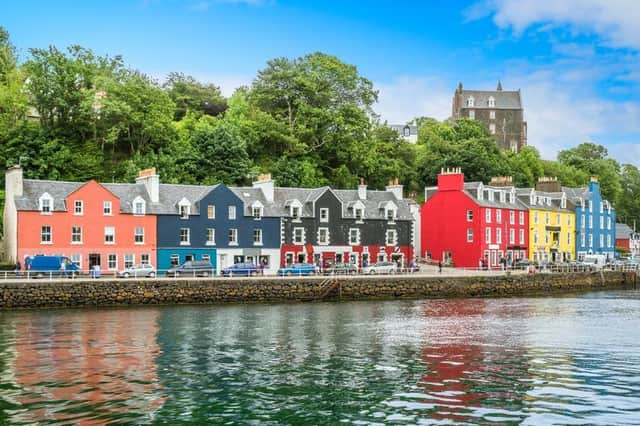Tony Blair’s government considered creating refugee camp on Isle of Mull and axing asylum system, records show
and live on Freeview channel 276
Tony Blair’s government considered creating a holding camp on the Scottish Isle of Mull to try and deter asylum seekers from coming to the UK, official documents have revealed.
The plan was part of a “nuclear option” for tackling the issue, which would have seen illegal migrants put straight back on the plane they arrived on with little or no right of appeal. The Labour Prime Minister’s chief of staff, Jonathan Powell, said they should legislate “incompatibility” with the European Convention on Human Rights to allow the removal of people at the risk of persecution, as well as abolishing the UK’s asylum system.
Advertisement
Hide AdAdvertisement
Hide AdThis echoes the current debate around Rishi Sunak’s proposals to send asylum seekers to Rwanda for processing and settlement. By March, the government will have spent £290 million despite no flights taking off as the policy has been declared unlawful by the courts. Sunak is trying to resurrect it by passing a bill declaring Rwanda a safe country and disapplying certain human rights legislation.
And Keir Starmer’s Labour has hinted that it could follow Blair’s lead if it gets into power. While Starmer has emphatically ruled out the Rwanda scheme, saying it is bad value, aides have briefed out that a Labour government may consider processing asylum applications at “offshore” centres abroad.


The proposals put forward to Blair have been revealed in the latest files released by the National Archives in Kew. Drawn up just months before the US-UK invasion of Iraq, the scheme also called for the creation of a series of regional “safe havens” in countries such as Turkey and South Africa – where refugees who could not be returned to their own country could be sent.
In October 2002, asylum claims reached a new monthly high of 8,800 and Blair was growing frustrated that “ever-tougher controls” in northern France had not had an impact. “We must search out even more radical measures,” he scrawled in a handwritten note.
As well as considering the asylum camp on the Isle of Mull, there were a number of other interesting revelations from the National Archives. Firstly, Blair responded enthusiastically to a proposal to return the Elgin Marbles to Greece in an attempt to boost support for London’s bid to host the Olympic Games.
No10 advisers believed the Marbles – also known as the Parthenon Sculptures – could be a “powerful bargaining chip” in the race to host the 2012 summer games. However, they warned any attempt to reach a sharing agreement with Athens could face stiff resistance due to the “blinkered intransigence” of the British Museum, where they had been housed since the 19th century.
This is of marked difference to Rishi Sunak, who cancelled a meeting with the current Greek Prime Minister after he said his country would like the artefacts returned.
Blair resisted calls for a public inquiry into the Soham murders of schoolgirls Holly Wells and Jessica Chapman by caretaker Ian Huntley. Following his arrest, it emerged Huntley had been able to get a job working with children, despite having been the subject of a series of complaints of rape and other sexual offences made to police in Humberside.
Home secretary David Blunkett wanted to order a public inquiry, however Blair’s initial response was that any inquiry should take place behind closed doors. But under pressure he agreed that Sir Michael Bichard, a former senior civil servant, should be able to conduct hearings in public.
The National Archives also reveal that Blair was warned by his private secretary, Jeremy Heywood, that the Downing Street press office had lost all credibility under Alastair Campbell. The warnings followed a series of bruising rows between the Labour government and the BBC over its coverage of the US-UK invasion of Iraq in 2003.
Campbell announced he was standing down after nine years as one of Blair’s most trusted aides, Heywood urged a complete overhaul: “The No 10 press office has lost all credibility as a reliable, truthful, objective operation. Even respectable journalists treat it with caution – part of a relentless politically-dominated spin machine."
Advertisement
Hide AdAdvertisement
Hide AdFollowing a brainstorming session with senior officials and advisers, the PM’s chief of staff Powell produced a paper entitled Asylum: The Nuclear Option, in which he questioned whether the UK needed an asylum system at all. “As an island, people who come here by sea have by definition already passed through a safe country. And very few of those who apply at airports are genuine refugees,” he wrote.
“So in fact what we should be looking at is a very simple system that immediately returns people who arrive here illegally. Uttering the word ‘asylum’ should not allow people to opt out of this system and give them the right to remain here for months or years while their cases are heard.


“Ideally we should not have an asylum hearing at all, simply a decision by an immigration officer to return someone followed by a one tier fast appeal against that decision if that is necessary.” Powell said that it should form part of “a big bang solution that would send a shock through the system”.
He said that officials in the office of the attorney general, Lord Goldsmith, had suggested setting up a camp on the Isle of Mull in the Inner Hebrides where people could be detained until they could be removed.
Advertisement
Hide AdAdvertisement
Hide Ad“I doubt that is going to work because of the nimby factor, but we have commissioned work to look at tagging, detention etc to help deter people and ensure we are able to return them as soon as their appeals have been heard,” Mr Powell wrote. Elsewhere, other officials suggested claimants could be sent to the Falkland Islands, 8,000 miles away in the south Atlantic.
Powell said they should also legislate “incompatibility” with Article 3 of the ECHR to allow the removal of people despite the risk of persecution – even though it would be challenged by the court in Strasbourg.
“We would like to extend this to return any illegal immigrant regardless of the risk that they might suffer human or degrading treatment,” he advised. “We would almost certainly lose this case when it got to Strasbourg. But we would have two to three years in the meantime when we could send a strong message into the system about our new tough stance.
“And we would make clear that if we lost in Strasbourg we would denounce the ECHR and immediately re-ratify with a reservation on Article 3.” Home Office lawyers warned that the measures would fall foul of the Geneva Convention on refugees. An exasperated Blair scrawled “just return them”, adding: “This is precisely the point. We must not allow the ECHR to stop us dealing with it.”
Advertisement
Hide AdAdvertisement
Hide AdBlair’s proposals around the asylum system would have likely been incredibly unpopular with the Parliamentary Labour Party at the time. The debate is identical to the current one being held by the Tory party, with the right urging Sunak to quit the ECHR while the left says it will make the UK a pariah state.
Ralph Blackburn is NationalWorld’s politics editor based in Westminster, where he gets special access to Parliament, MPs and government briefings. If you liked this article you can follow Ralph on X (Twitter) here and sign up to his free weekly newsletter Politics Uncovered, which brings you the latest analysis and gossip from Westminster every Sunday morning.
Comment Guidelines
National World encourages reader discussion on our stories. User feedback, insights and back-and-forth exchanges add a rich layer of context to reporting. Please review our Community Guidelines before commenting.
